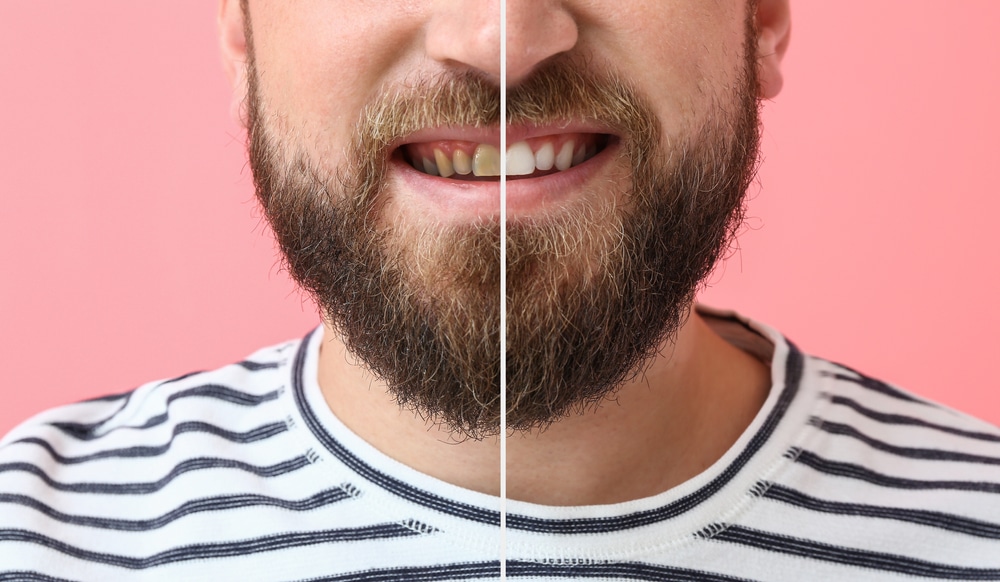Dental Cleaning in Jacksonville, FL
Maintaining a beautiful and healthy smile requires regular dental cleanings. It is also a perfect way to prevent tooth decay and cavities. Dental cleanings protect against periodontal disease caused by inflamed gums and weakened bones that hold teeth. You can maintain your dental health and live happier lives with routine dental cleaning.
Therefore, it is important to note that your dental cleaning will always be customized to your specific needs and health objectives. If you are unsure what to expect from your dental cleaning at River Oaks Dental, read on to learn more, including what it is and how it works.
Dental Cleaning: What is it, and How Does it Work?
Dental cleaning is a preventative process that your dental hygienist or dentist performs to help you attain optimal oral health. This non-surgical process can vary in duration based on the condition of your teeth and gums and your last cleaning. However, it can take an hour or less on average.
During a dental cleaning, your dentist will remove dental plaque and tartar that have developed on your teeth to prevent them from cavities and other gum diseases. This process involves both a dental hygienist and a dentist. Your dental hygienist will collect the required examinations and inform the dentist when the process is complete. After that, your dentist will examine your teeth to look for existing restorations and gum diseases.
Here are the two key processes involved in dental cleaning:

Routine Cleanings
During a routine cleaning, our hygienist utilizes specialized equipment to clear sticky plaque and hard tartar deposits from the surface of your teeth above your gums. This form of cleaning is essential for preventing and treating gum disease.
Deep Dental Cleanings
Deep dental cleaning involves a unique cleaning method that removes plaque, germs, and tartar below the gum line and beneath the tooth roots. In most cases, bacteria that trigger gum disease usually lurk in hard tartar layers on the surfaces of your teeth that are shielded by your gums. As a result, deep dental cleaning prevents gum disease from progressing and leading to tooth loss.
Scaling and Root Planing
Scaling and root planing (SRP) is a non-surgical procedure that removes bacteria while smoothing up exterior surfaces. This is primarily intended for high-risk patients or individuals who have just been diagnosed with periodontal disease.
Since SRP is a more intensive operation, patients may need to visit our dental specialist several times to complete the process. In addition, our dentist at River Oaks Dental, cleaning in Jacksonville, FL, may also use an antibiotic to treat the bacteria causing the infection.
Periodontal Deep Cleaning
Periodontal disease, like diabetes, is a systemic condition that must be closely monitored. As a result, our dental cleaning in Jacksonville, FL, is pleased to provide a deep periodontal cleaning to guarantee that your teeth are cleaned above and below the gum line to help control the infection and prevent it from worsening.
Our periodontal deep cleaning procedure entails tooth scaling and root planing to remove any plaque, tartar, and debris obstructing your smile. After the dental deep cleaning procedure, your gums will be able to join and recover more quickly, enabling you to control your symptoms and avoid future problems from periodontal gum disease.
How Often Should You Have a Dental Cleaning?
It is advised to have your teeth cleaned every six months. A more frequent cleaning, on the other hand, is advantageous to your general oral health. The duration may vary depending on your oral condition. For instance, if you have had periodontal disease, you should have a dental cleaning every three to four months.

What To Do in Between Dental Cleanings
Maintaining a healthy lifestyle and practicing good oral hygiene go hand in hand. If you take proper care of your mouth, you will have reduced your chances of developing dental problems. Of course, it is advisable to visit your dentist at least every six months regularly. Still, you can reduce your likelihood of requiring more dental cleanings and inspections by simply paying closer attention to your dental health. You can achieve this by:
- Maintaining a healthy diet: Reduce your intake of sugar and soda. This is because sugar increases your mouth’s acidity and promotes bacteria growth. Therefore, lowering your sugar intake, particularly from sugary drinks, will significantly impact your dental health. If you do consume sugary foods or beverages, it is best to rinse and floss afterward.
- Avoid smoking: You should avoid smoking during dental cleaning since it will ruin the cleaning effort. Furthermore, nicotine and tar can coat your mouth and teeth, damaging your gums. They also promote the growth of germs and debris, increasing the likelihood of developing gum diseases.
- Chewing gum can make your mouth healthier: This can be a great choice if you find it hard to brush your teeth after meals regularly. Chewing gums stimulates saliva production, which has natural antibacterial characteristics. It also helps cleanse your mouth, keeping your teeth healthy and your breath fresh.
Benefits of Routine Dental Cleaning
Routine dental cleaning is not only vital for keeping your smile healthy, but it is also good for your general health. For instance, it aids in preventing further complications such as stroke, bone loss, heart disease, and even cancer.
Routine dental cleaning is important because it helps in:
- Early diagnosis of cancer: Regular tooth cleaning allows your dentist to detect cancerous symptoms early, especially cancer roots, saving you from expensive medical costs or complications.
- Prevention of gum condition: It helps you prevent uncomfortable symptoms, including bad breath, toothache, and bleeding gum.
- Getting professional dental care: A regular dental cleaning allows your dentist to discover early signs and symptoms of problems like broken fillings and fractures.
- Brightening your smile: Routine dental cleaning removes most stains that weaken and discolor your teeth, resulting in a healthier, brighter smile.
Experience Exceptional Dental Cleaning at River Oaks Dental in Jacksonville, FL
A routine dental cleaning at River Oaks Dental in Jacksonville, FL, coupled with proper oral self-care, may keep your teeth healthy and your mouth fresh. Our dentists are ready to assist you in treating and preventing gum disease and dental decay. Call us at 904-348-0416 to schedule your appointment for preventative, restorative, or cosmetic dental services today!
Frequently Asked Questions
What Are Early Signs of Dental Trouble?
Early signs of dental disease may include bad breath, tooth decay, and toothaches. Periodontal infections, tooth sensitivity, and mouth sores are also signs that you may develop dental problems.
What Type of Toothbrush and Toothpaste Should I Use?
When it comes to toothbrushes, always choose ones with soft bristles. Even if you wash your teeth excessively forcefully, these are less likely to damage the enamel. Also, your toothbrush should have rounded ends to reduce the risk of gum inflammation. Most crucial, choose a toothbrush that makes it easy for you to brush your teeth thoroughly.
Does a Rinse or Mouthwash Help?
Yes, a rinse or mouthwash is essential for dental care since it freshens bad breath, minimizes plaque and gingivitis, fights tooth decay, and prevents cavities. Moreover, fluoride-containing mouthwashes can aid in remineralizing your teeth.
Do I Really Need to Floss?
Yes, flossing can wash away all surfaces of your teeth, even the spaces between your teeth that your toothbrush cannot reach. Flossing is a low-risk, low-cost method of cleaning your teeth.
Why Do I Need Dental Exams?
More regular dental checks will help you avoid periodontitis, a severe gum condition that can result in infection and loss of teeth.
Are Dental X-rays Safe and Needed?
Yes, dental X-rays are harmless and can often improve your dental health. You shouldn’t be worried about radiation exposure because it is minimal.
What Can Happen if I Do Not Keep My Teeth Clean?
If you don’t brush your teeth, you run the risk of developing a variety of dental problems. The most prevalent is the formation of cavities, which can lead to tooth decay.
Image credit: Olena Yakobchuk / Pixel-Shot / Shutterstock
